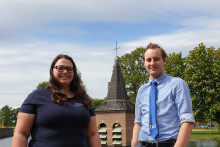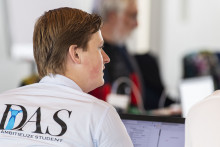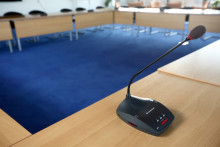Kemper: ‘I agree. There is a lot of pressure on students to achieve courses on time. Now the system is still too strict. I speak from experience: by missing one course, I had to redo everything. That is why it is very good that we move away from the 0-15 EC rule and work towards a Twente Education Model (TOM) 2.0, in which the study programs can determine the rules more themselves. Ultimately, they know best what a curriculum should look like.‘
Bolhuis: ‘There is certainly study pressure, but that is not only due to TOM. The transition to the student loan system also plays a major role, for example. It is particularly unfortunate that students are punished if they want to do something besides their studies. The expiry of the 0-15 EC rule is a major step in the right direction. In addition to studying itself, I grant every student a great student life. DAS is not necessarily all about activism: we think ambition is important. This is possible in a board year, but also through a challenging part time job or an Honors Program. For non-EEC (European Economic Community) students it is extra difficult to attain a student life like that, because they have to get a minimum of 30 EC per year to keep their visa.‘
Kemper: ‘It is a pity that internationals are less active. For them its also important to do fun activities during their study time. We are here for education, but also for a nice student time. Study pressure is also one of the reasons for the increasing psychological problems among students. That is why we argue for more psychologists.‘
Kemper: ‘I would not use the word fail. The UT is at the start of a transition period. I admit, it is difficult. But there are all kinds of factors for that. Take for example the EC / visa regulation for non-EEC students, or the language policy. Until recently, many documents were not available in English, which means that international students are lagging behind.‘
Bolhuis: ‘The integration of international students is a challenge. We want to offer the international student the same experience of the student life in Enschede as the Dutch student. In its roots, the UT is still a Dutch university. It takes time to bridge the cultural differences.‘
Kemper: ‘One of our party points is the multicultural classroom. With the help of courses, we want to foster greater understanding between students, as well as between students and teachers. An example of such a course is a language tandem. This is a kind of buddy system in which students talk about cultural differences. What is the difference between two languages, for example? We think internationalization is a two-way street. That's why it's good to start a conversation.‘
Bolhuis: ‘It really depends on the situation. The first plans for the language policy have gone too far, in the sense that we have to speak English at any time. At the coffee machine with only Dutch people it seems exaggerated to speak English. Moreover, people can express themselves better in their own language – that possibility must remain. We do see that teachers' English is not particularly good or even bad, which also applies to some students. That is why more attention needs to be paid to the use of English. A Dutch course for international students also helps with integration. I would not go so far as to say it should be mandatory, but more attention to the possibilities is not a bad idea. ‘
Kemper: ‘I largely agree with DAS. The most important thing is that we don't want to force anyone, which will make things unpleasant. Try to push employees and students in the right direction as a university. It is also important that people do not stay in their own bubble, that open view is also part of the academic world.‘
Bolhuis: ‘Absolutely! As chairman of the Sportkoepel, I experience it from the other side. The indoor facilities in particular are under pressure. In the evenings there is hardly a place left and the fitness is always overcrowded. It also applies to culture: there are associations, such as the orchestra and 4 Happy Feet, who have to rehearse in the Bastille due to lack of space.‘
Kemper: ‘Sports and cultural facilities are regularly used for educational purposes. That cannot be the intention. There must be room for hobby and passion at the UT.‘
Kemper: ‘I don't think that's a good idea. A maximum capacity would be very restrictive for students who want to follow their education in Twente. In addition, entering a numerus fixus takes two years. Discouraging people from studying in Twente does not seem like a good plan to me either.‘
Bolhuis: ‘If we continue to grow, the university will have to invest in its facilities. That does not only apply to education, but also to housing. ‘
Kemper: ‘Enschede is indeed at the maximum in terms of student accommodation. The university itself is not allowed to invest in real estate and will therefore have to push with the housing associations and the municipality to realize more affordable youth housing. At the UvA, internationals who do not receive a travel product from the government receive a public transport subsidy from the university. UReka wants a similar kind of initiative at the UT. In this way, international students can also move a little further away and the pressure on the rental market will drop. Moreover, internationals can explore the Netherlands with their subsidized public transport card, which in turn promotes integration.‘
Finally, a question instead of a statement: you often agree. What are the differences between UReka and DAS?
Kemper: ‘The differences lie mainly in our supporters, I think. UReka is well represented at the study associations and the faculty councils. We also have more internationals on our list. For DAS, the supporters mainly come from the student and sports associations.‘
Bolhuis: ‘DAS was indeed founded from a number of sports and student associations. We still have a meeting with them every six weeks. There are no international students on our list, but they are of course very welcome. Student ambition is important to DAS. Sure, education must be in place, but we also think sports facilities are very important.‘
Kemper: ‘UReka focuses more on education and student welfare. In addition, we will focus specifically on transparency in the coming year. For example, we want more communication between the participation bodies. We will also use our social media more actively to communicate with the supporters about, for example, the University Council. Suppose the Executive Board sends a policy document, then we consult with our supporters to determine a position. That is important, because in the end we are with nine students in the University Council for more than ten thousand students at the UT.‘







